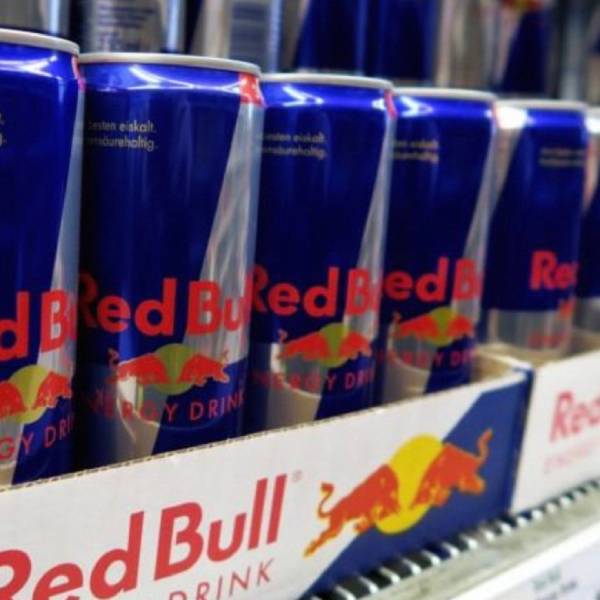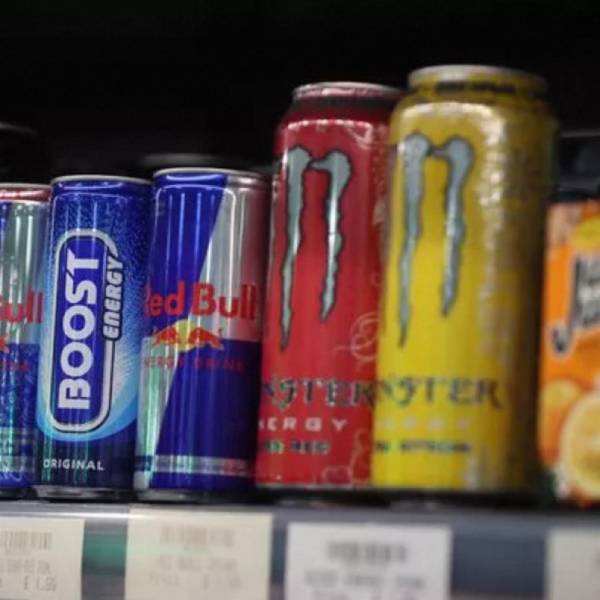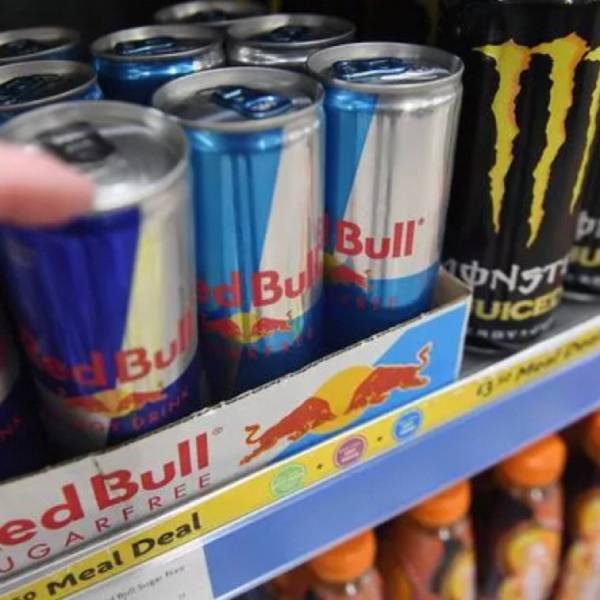Introduction to Taurine in Energy Drinks
Energy drinks often include an ingredient called taurine. Its presence is not from bull sperm, contrary to some myths. Taurine is an amino acid with a crucial role in the formula of these popular beverages.
The Historical Context of Taurine
Taurine originates from natural sources, though not the kind some believe. Its name derives from the Latin word ‘Taurus,’ meaning bull, due to its initial discovery in ox bile. However, the taurine in drinks today is synthetically produced, with no link to animals.

Taurine’s Role and Benefits
This substance is vital for the body. It supports cardiovascular function, nerve system development, and bile acids formation. Some also believe taurine can enhance athletic performance and reduce anxiety. These benefits make it a common addition to energy drink recipes, though its effects may vary among individuals. Understanding the facts about energy drinks reveals that they often include ingredients like taurine, which is essential for cardiovascular health and may even enhance athletic performance, showcasing how nutritional components can influence both physical and mental well-being.
Composition of Energy Drinks
The understanding of what goes into energy drinks is key to recognizing their effects on health. These drinks are a mixture of several ingredients, each with a specific purpose.
The Key Ingredients in Energy Drinks
Most energy drinks have a common foundation of ingredients. These include caffeine, taurine, B vitamins, and often herbs or other supplements. Sugar is also a common additive for taste and energy. Manufacturers argue that these ingredients can boost energy and concentration.
Health Effects of Caffeine and Sugar
Caffeine, the primary component for ‘energy,’ can enhance alertness. Yet, it may lead to side effects when consumed in large amounts. These include restlessness, insomnia, and a rapid heartbeat. Sugar adds taste and quick energy, but too much can result in increased calorie intake and potential weight gain. In the long term, it may contribute to dental problems and metabolic issues like diabetes. Understanding these elements can help consumers make informed choices about their energy drink consumption. While understanding the effects of caffeine and sugar in energy drinks is crucial for making informed choices, many wonder, do you have to be 18 to buy energy drinks?
Misconceptions About Taurine and Bull Sperm
The myth that energy drinks contain bull sperm has been a long-standing misconception. This false belief likely stems from a misunderstanding of the word ‘Taurine,’ which sounds similar to ‘Taurus,’ the Latin word for bull. Additionally, early scientific studies did trace taurine back to ox bile, which may have further fueled these rumors. However, rest assured that today’s energy drinks do not contain any such ingredients from bulls or other animals.
Origin of the Bull Sperm Myth
The origin of the bull sperm myth can be traced to the name ‘Taurine.’ It’s derived from ‘Taurus,’ which people link to bulls. Another factor is the initial discovery of taurine in ox bile. Such associations have led to wild stories and unfounded claims about energy drinks and bull sperm.
The Truth About Taurine Synthesis
In truth, taurine in energy drinks is synthesized in a lab. It’s not sourced from any animal. The synthetic process ensures a pure and consistent ingredient for energy drinks. This process is not only more ethical but also aligns with dietary restrictions and vegetarian or vegan lifestyles. Consumers can enjoy energy drinks without concern for such myths. Many people want to enjoy energy drinks without worrying about their ingredients, and since taurine is synthetically produced, it caters to various dietary preferences. If you’re considering options on a budget, you might wonder: can you buy energy drinks with food stamps?
The Safety Profile of Energy Drinks
When considering energy drinks, safety is a vital aspect. Consumers and health experts alike scrutinize their ingredients and effects.
FDA’s Stance on Taurine
The FDA deems taurine safe for consumption. This ruling applies to the synthetic form found in energy drinks. It’s not sourced from animal byproducts such as bull sperm, as rumors suggest. Studies confirm that synthetic taurine has a role in many bodily functions. These include heart health, muscle function, and bile salt formation.

Potential Health Risks Associated with Energy Drinks
Despite FDA’s approval of taurine, energy drinks carry potential risks. High caffeine and sugar content can lead to palpitations, dehydration, and insomnia. The Mayo Clinic advises caution with these drinks. They may contain herbal extracts and vitamins alongside taurine and caffeine. Their combined effect on the body, especially in excessive amounts, is unclear. Adults may tolerate them, but children and teens should avoid them entirely. The American Academy of Pediatrics concurs, citing risks to developing bodies. Overconsumption has led to emergency room visits. Risks increase when mixing energy drinks with alcohol. Monitoring intake of caffeine and sugar is key to reducing possible negative effects. The health impacts can be significant, thus moderation is essential.
Nutritional Impact of Energy Drinks
Energy drinks, with their blend of caffeine, taurine, and other ingredients, have an effect on the body’s nutrition and health.
Impact on Cardiovascular Health
Excessive intake of energy drinks can lead to cardiovascular issues. The high caffeine content may cause a rise in heart rate and blood pressure. Taurine, though safe, is combined with other stimulants that could strain the heart, especially when consumed in large quantities or by individuals with pre-existing heart conditions.
Implications for Exercise Performance
While taurine is linked to potential exercise benefits, this is often in a controlled dose. In energy drinks, it’s combined with high levels of caffeine and sugar, which can lead to a short-term energy boost followed by a crash. For athletes, it’s important to balance energy drinks with water and other natural sources of energy to maintain endurance and performance.
Considerations for Children and Adolescents
Energy drinks are not suitable for children and adolescents. Their developing bodies are sensitive to high levels of caffeine and sugar found in these drinks. This can lead to negative effects on growth, sleep patterns, and attention span. Health experts advise against the consumption of energy drinks by this age group entirely.
Alternative Sources of Taurine
While energy drinks may be a common source, taurine is available elsewhere. Understanding these sources helps ensure adequate intake without relying on highly caffeinated beverages.
Dietary Sources of Taurine
Taurine occurs naturally in various foods, especially in animal proteins. Key dietary sources include:
- Meat, particularly beef and chicken
- Seafood, such as fish and shellfish
- Dairy products, like milk and cheese
- Eggs, which provide a smaller yet significant amount
These foods can help meet daily taurine needs. They offer taurine in its natural form. This may be better assimilated by the body compared to synthetic forms.
Taurine Supplements and Their Usage
For those who don’t consume animal products or have higher needs, supplements are an option. They provide a concentrated dose of taurine. Here’s what you should know:
- Supplements come in capsule or powder form
- They are suitable for vegetarians and vegans
- The typical dosage ranges from 500 to 2000 mg per day
- Always consult with a healthcare professional before starting supplements
Supplements can support specific health conditions. They can also cater to dietary restrictions. However, they are not a substitute for a balanced diet rich in natural taurine sources.
Consumer Guidance on Energy Drinks
Navigating the world of energy drinks can be daunting. Hence, guidance is crucial for safe and responsible consumption.

Recommendations for Consumption
When it comes to energy drinks, moderation is key. Here’s what you need to keep in mind:
- Limit energy drinks to occasional use rather than daily.
- Opt for smaller sizes to control caffeine and sugar intake.
- Avoid energy drinks late in the day to prevent sleep disruption.
- Don’t mix energy drinks with alcohol, as this increases health risks.
- Consider natural boosters like a balanced diet and exercise for energy.
- If you have any health conditions, particularly heart issues, seek advice from a doctor before consuming.
Monitoring Caffeine and Sugar Intake
Keeping track of how much caffeine and sugar you consume from energy drinks is important. Here are some tips:
- Read labels to know the caffeine and sugar content per serving.
- Be aware of the added sugars, as they contribute to calorie intake.
- Stick to the recommended limit of under 400 mg of caffeine daily for adults.
- Track your overall daily caffeine intake from all sources, not just energy drinks.
- Use monitoring as a tool to avoid overconsumption and related health issues.